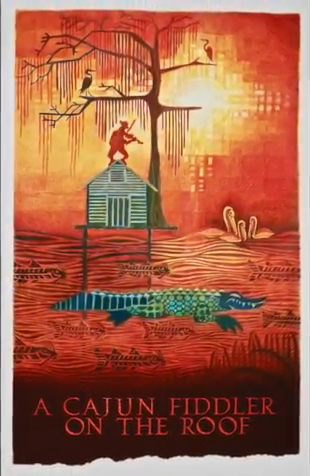Like many Louisiana image makers, this state is my muse
and I’m driven in my own way to portray its culture and
tell its stories. Although born and raised in New York
City, I’ve lived most of my life in southern Louisiana.
Perhaps moving to a different region with its own unique
culture has inspired my interest in how our environment
shapes our identities.
It
occurred to me that the experiences of Cajuns and the
local Native Americans are very similar to the Jews in
the story of Fiddler on the Roof. Because of coastal
erosion brought on by climate change, oil drilling and
river levees, many local people have been driven from
Louisiana’s southern-most areas. is has threatened their
livelihood, their sense of community, their culture and
way of life. In other words, their struggle to hold on
to tradition is as precarious as a ddler on the roof.
Whether driven from the land by cossacks or by coastal
erosion, the challenge is the same. However, in my
drawing, the ddler has been driven to his roo op by the
rising water—much like many New Orleaneans during
Hurricane Katrina.
I drew
A Cajun Fiddler on the Roof before starting Reggie’s 26
Seeds course. So it was originally drawn without text at
the bottom. My process begins with an idea, followed by
research and a little sketching. Typically, I develop a
composition by creating individual drawings of different
elements in graphite and move them about the rectangular
background and re ne until I achieve the nal
composition. I then lay a large sheet of tracing paper
over the collage and trace it with pencil. e tracing is
turned into a carbon and transferred to thick
illustration board. Although it might seem that the
drawing is locked in at this point, there is much
opportunity for improvisation. While coloring it with
Prismacolor pencils, I see new things emerge in the
composition. ere’s a kind of push and pull as some areas
are emphasized over others, new shapes evolve through
color and texture can be created by erasing and
blending. |
The completed artwork was sent to an imaging center
where a high resolution scan was made and a le provided
in pdf form. A er opening the pdf in Photoshop, I
extended the bottom to make room for calligraphy, giving
it a torn edge to echo the feel of spanish moss (I think
I probably went overboard on blurring the bottom).
The pressurized Roman calligraphy was created with a #2
Mitchell and brause nibs for the serifs. A er hours of
practicing how to control the pressure and the pen
strokes, I drew the letters on a separate sheet of paper
which I had scanned, brought into Photoshop and added a
reddish texture taken from the drawing. e attened
Photoshop image was returned to the imaging center and
an inkjet print was made.
A word about materials: Some people have asked if using
Prismacolor pencils on such a large image is time
consuming and expensive. I’ve found good prices online.
Although I apply heavy layers of pencil, a single pencil
covers a lot of space. ey’re high quality and
interesting shades can be created by combining different
colors. It does, indeed, take some time to cover a lot
of ground with such a ne point, but I like the control
it gives me and the ability to do ne, detailed work.
Heavy layering almost gives the appearance of paint
without having to spend time on paint set up and clean
up. So if I only have 15 minutes here and there to work
on a project that day I can quickly pull out my pencils.
It eliminates the expense of paint brushes. And nally,
colored pencils are very portable, so I’m not con ned to
my studio. While I would like to include other materials
such as watercolor and collage in future projects, I
think colored pencils will remain a favorite.
I never intended for the original A Cajun Fiddler on the
Roof image to contain text. But the addition of
calligraphy has added another dimension to story telling
which I hope gives it, and future work, a deeper, more
meaningful experience. |

 Video
Video